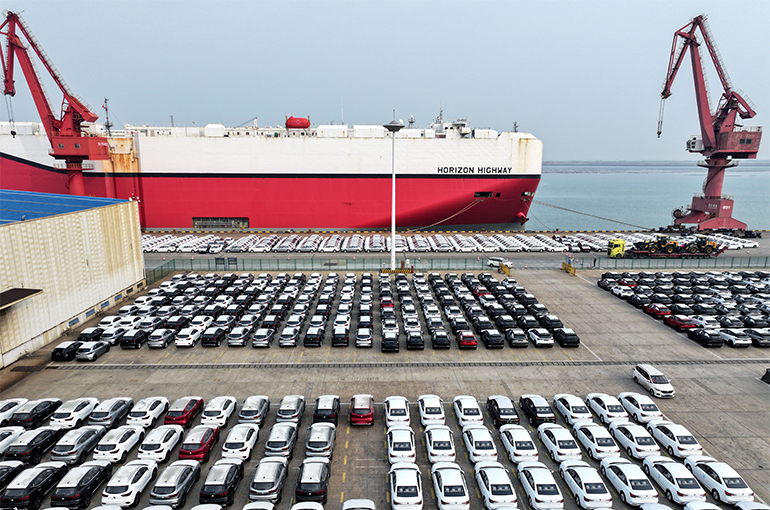 Cheaper Chinese Cars Gain Market Share From Japanese, South Korean Rivals in Middle East
Cheaper Chinese Cars Gain Market Share From Japanese, South Korean Rivals in Middle East(Yicai) Dec. 24 -- Chinese automakers are winning over buyers in the Middle East, a market traditionally dominated by Japanese and Korean brands, through localized product designs and competitive pricing.
Chinese-made vehicles offer better value than Japanese and Korean brands, while rising demand for electric vehicles in countries like Israel is creating new opportunities for Chinese manufacturers in this import-dependent region, Liu Xing, a local car importer, told Yicai.
Chinese exports of passenger vehicles to the ME reached 420,000 units in the first half of this year, up 46 percent from a year earlier. EVs accounted for one-fifth of these exports, according to customs data.
Some of the hottest regional markets for Chinese auto firms are Saudi Arabia and the United Arab Emirates, said Yan Linhui, partner at Fosun Capital. Saudi Arabian consumers prefer powerful sport utility vehicles due to underdeveloped road infrastructure and family-oriented travel culture, while UAE residents, benefiting from better road conditions, are open to various types of imported vehicles, said Yan who is also a senior China representative at economic zone operator Khalifa Economic Zones Abu Dhabi.
China exported 213,000 vehicles to Saudi Arabia, its sixth-largest automotive export market, and 159,000 to the UAE, its ninth-largest, last year, according to the China Association of Automobile Manufacturers. For comparison, exports to Saudi Arabia totaled just 50,000 units in 2019.
In Saudi Arabia, compact combustion-engine SUVs manufactured by Changan Automobile and Geely Automobile Holdings are particularly popular. Changan has built strong relationships with local car dealers over the years.
Localization and EV Growth
Chinese automakers have adapted to regional conditions by enhancing their vehicles' off-road capabilities, improving air conditioning systems, reducing sunroof options, and strengthening tire durability to suit the dry climate and local consumer preferences, Yan explained.
The ME market is particularly attractive to Chinese EV manufacturers as they can command higher prices than on the home turf, Yan added.
EV sales are rising rapidly in Israel, Jordan, and Egypt as regulatory environments evolve. Israel, in particular, plans to prohibit sales of gasoline and diesel-powered vehicles by 2030.
Chinese EV manufacturers sold 29,000 units in Israel last year, more than double the 2022 figure, capturing around 61 percent of the local EV market, according to the Israel Vehicle Importers Association. Sales reached 27,000 units in the first half of this year, with market share expanding to over 68 percent. BYD's Yuan Plus led sales with nearly 7,270 units.
Israel's limited automotive manufacturing base, absence of domestic brands, and dependence on imported oil create opportunities for competitively priced Chinese EVs, according to Yan. Similar market conditions have made affordable EVs popular in Jordan, which lacks domestic oil production.
However, Chinese manufacturers face significant challenges. Yan pointed out that inadequate after-sales service makes some local consumers hesitant to purchase Chinese vehicles. He cautioned that without robust service networks and strong brand recognition in the ME, the current sales momentum might not be sustainable.
Yan advised Chinese automakers to partner with established dealer groups for more efficient market entry, helping them navigate governmental regulations and legal requirements.
Editors: Tang Shihua, Emmi Laine